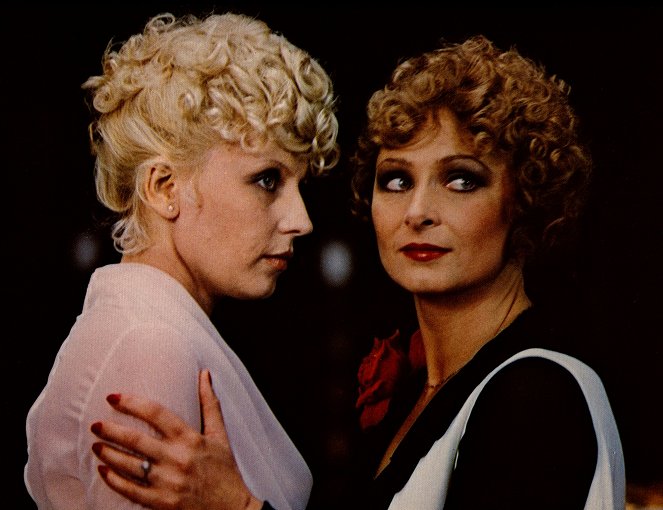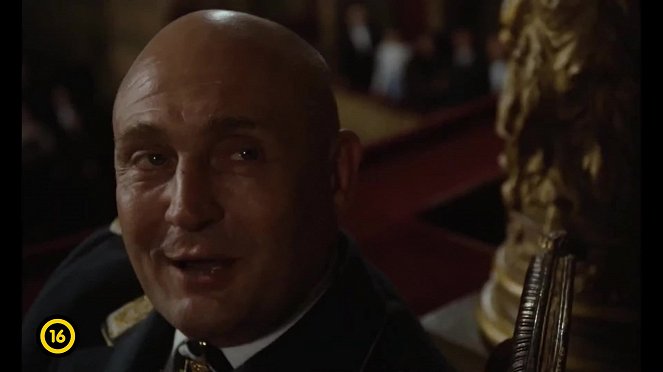Regie:
István SzabóKamera:
Lajos KoltaiBesetzung:
Klaus Maria Brandauer, Krystyna Janda, Ildikó Bánsági, Rolf Hoppe, György Cserhalmi, Péter Andorai, Karin Boyd, Christine Harbort, Tamás Major (mehr)Streaming (1)
Inhalte(1)
Der Schauspieler Hendrik Höfgen, ebenso genial wie bestechlich, avanciert in der Zwischenkriegszeit zum Star des Berliner Theaterlebens. Nach Hitlers Machtergreifung denkt er vorübergehend an Widerstand und Exil, schließt dann aber doch den 'Pakt mit dem Teufel' und feiert als Mephisto Triumphe, erkauft durch seine Absage an Idealismus und Charakterstärke. (ORF)
(mehr)Videos (2)
Kritiken (3)
Die Spiegelung von Klaus Mann, Sohn von Thomas Mann, zum Thema Gustaf Gründgens (1899-1963). Im Roman und später im Film wird sie als Hendrik Höfgens Aufstieg durch seinen provinziellen Flirt mit der Linken in Hamburg gestaltet, aber bald mit seinem Karrieresprung in Berlin gebrochen und in eine Verbeugung vor der Rechten verwandelt. Klaus Maria Brandauer lebt traditionell alle Höhepunkte seines Charakters in vollen Zügen aus. Als ehrgeiziger Schauspieler taucht er in die theatralische Atmosphäre der Vorkriegszeit ein, in jene unwiederholbare Welt, die so brutal zerstört wurde. Diese Zerstörung wird dann Hand in Hand den Aufstieg und Fall vieler solcher Hendricks verursachen, die in diesen wenigen Jahren noch nicht einmal gemerkt haben, dass die Zukunft für sie nur noch schlechter werden kann. Das bei weitem Interessanteste ist jedoch die Darstellung einer schwarzen deutschen Frau in der Handlung, was für Filme aus der Zwischenkriegszeit wirklich ungewöhnlich ist.
()
From the three-part famous series by István Szabó, this is the first and, from my perspective, the strongest film, which also provided Klaus Maria Brandauer with an immensely grateful role of an ambitious actor who became a pawn in a power game. Thanks to the role, he definitively became a big star on the silver screen. While Szabó uses specific historical events and period props, he creates a timeless film about conformity, manipulation, and careerism, which leads to the loss of one's own identity. Szabó's Prime Minister is not a specific historical figure, but an embodiment of the will for power and a person in the highest position of any dictatorship. The very clever screenplay shows the gradual destruction of the personality in numerous details and hints at the path down which the dark initial compromises can lead. Overall impression: 100%.
()
A unique stylistic experience. Szabó stages the shots in a seemingly conventional way, but their internal dynamics are simply amazing and the narrative moves at a tremendous pace across the very short and intense scenes, even though the intimate framework does not suggest it at first glance. The dialogues are often cut off half-way and composited into the next scene, thanks to which the film forces us to think and constantly hold our attention, which it manages to do throughout, not to mention how incredibly clever and engaging the dialogues themselves are. Also in terms of meaning, the film fully lives up to its legendary reputation by relating to the viewer the horrific immoral machinery of the described era through the ambivalent and continuously changing personality of the lead character, initially bohemian, then naively idealistic and finally completely reprobate, thanks to which it manages to densely erase the gap between "audience and stage" mentioned several times in the script. Although the depressing events I had secretly hoped for did not fully erupt, I still felt a lump in my throat and during the excellent final scene I got a chill... And that’s good :)
()
Galerie (26)
Photo © Mafilm



Werbung